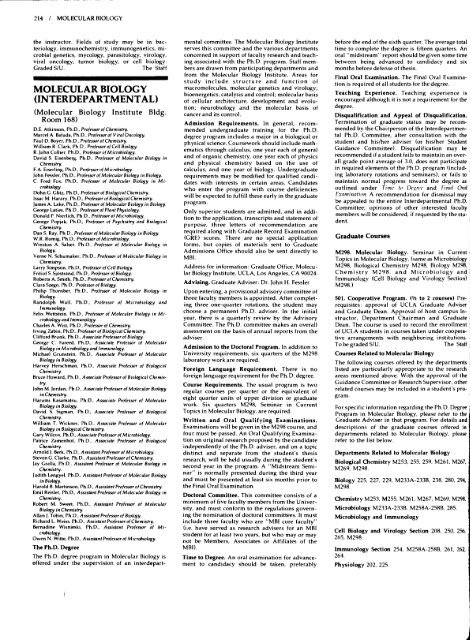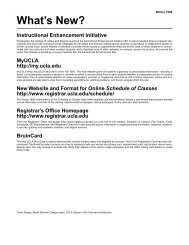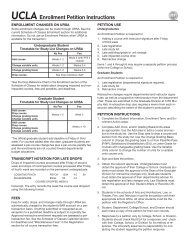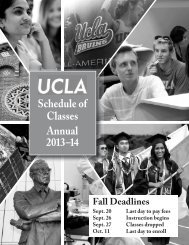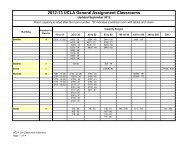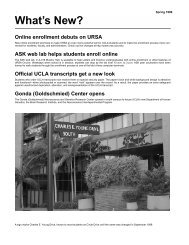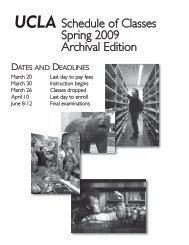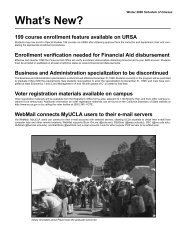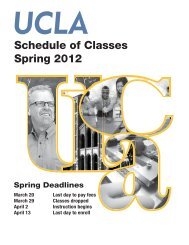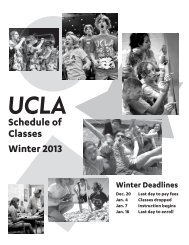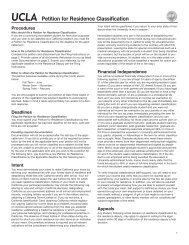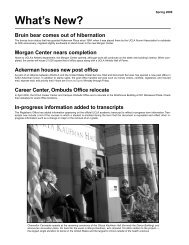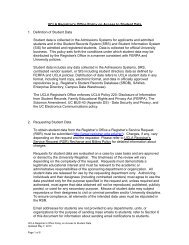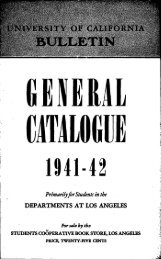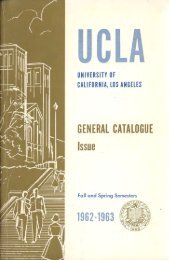UCLA Graduate Catalog 1980-81 - Registrar - UCLA
UCLA Graduate Catalog 1980-81 - Registrar - UCLA
UCLA Graduate Catalog 1980-81 - Registrar - UCLA
You also want an ePaper? Increase the reach of your titles
YUMPU automatically turns print PDFs into web optimized ePapers that Google loves.
214 / MOLECULAR BIOLOGY<br />
the instructor . Fields of study may be in bacteriology,<br />
immunochemistry , immunogenetics, microbial<br />
genetics, mycology, parasitology, virology,<br />
viral oncology, tumor biology, or cell biology.<br />
Graded S/U. The Staff<br />
MOLECULAR BIOLOGY<br />
(INTERDEPARTMENTAL)<br />
(Molecular Biology<br />
Room 168)<br />
Institute Bldg.<br />
D.E. Atkinson , Ph.D., Professor of Chemistry.<br />
Marcel A. Baluda, Ph.D., Professor of Viral Oncology.<br />
Paul D. Boyer, Ph.D., Professor of Chemistry.<br />
William R. Clark, Ph.D., ProfessorofCell Biology.<br />
R. John Collier. Ph.D., Professor of Microbiology.<br />
David S. Eisenberg , Ph.D., Professor of Molecular Biology in<br />
Chemistry.<br />
F.A. Eiserling, Ph.D., Professor of Microbiology.<br />
John Fessler , Ph.D., Professor of Molecular Biology in Biology.<br />
C. Fred Fox, Ph.D., Professor of Molecular Biology in Microbiology.<br />
Dohn G. Glitz, Ph.D., Professor of Biological Chemistry.<br />
Issac M . Harary , Ph.D., Professor of Biological Chemistry.<br />
James A . Lake , Ph.D., Professor of Molecular Biology in Biology.<br />
George Laties, Ph.D., Professor of Plant Physiology.<br />
Donald P. Nierlich, Ph.D., Professor of Microbiology.<br />
George Popjak, Ph.D., Professor of Psychiatry and Biological<br />
Chemistry.<br />
Dan S. Ray, Ph.D., Professor of Molecular Biology in Biology.<br />
W.R. Romig, Ph.D., Professor of Microbiology.<br />
Winston A. Salser, Ph.D., Professor of Molecular Biology in<br />
Biology.<br />
Verne N. Schumaker, Ph.D., Professor of Molecular Biology in<br />
Chemistry.<br />
Larry Simpson, Ph.D., Professor of Cell Biology.<br />
Fritiof S. Sjostrand, Ph.D., Professor of Biology.<br />
Roberts A. Smith, Ph.D., Professor of Chemistry.<br />
Clara Szego, Ph.D., Professor of Biology.<br />
Philip Thornber , Ph.D., Professor of Molecular Biology in<br />
Biology.<br />
Randolph Wall, Ph.D., Professor of Microbiology and<br />
Immunology.<br />
Felix Wettstein , Ph.D., Professor of Molecular Biology in Microbiology<br />
and Immunology.<br />
Charles A. Wist, Ph.D., Professor of Chemistry.<br />
Irving Zabin, Ph.D., Professor of Biological Chemistry.<br />
Clifford Brunk, Ph.D., Associate Professor of Biology.<br />
George C. Fareed, Ph.D., Associate Professor of Molecular<br />
Biology in Microbiology and Immunology.<br />
Michael Grunstein, Ph.D., Associate Professor of Molecular<br />
Biology in Biology.<br />
Harvey Herschman. Ph.D., Associate Professor of Biological<br />
Chemistry.<br />
Bruce Howard, Ph.D., Associate Professor of Biological Chemistry.<br />
John M . Jordan, Ph.D., Associate Professor of Molecular Biology<br />
in Chemistry.<br />
Harumi Kasamatsu, Ph.D., Associate Professor of Molecular<br />
Biology in Biology.<br />
David S. Sigman, Ph.D., Associate Professor of Biological<br />
Chemistry.<br />
William T. Wickner , Ph.D., Associate Professor of Molecular<br />
Biology in Biological Chemistry.<br />
Gary Wilcox, Ph.D., A ssociate Professor of Microbiology.<br />
Patrice Zamenhof, Ph.D., Associate Professor of Biological<br />
Chemistry.<br />
Arnold J. Berk , Ph.D., Assistant Professor of Microbiology.<br />
Steven G. Clarke, Ph.D., Assistant Professor of Chemistry.<br />
Jay Gralla, Ph.D., Assistant Professor of Molecular Biology in<br />
Chemistry.<br />
Judith Lengyel, Ph.D., Assistant Professor of Molecular Biology<br />
in Biology.<br />
Harold B. Martinson, Ph.D., Assistant Professor of Chemistry.<br />
Emil Reisler, Ph.D., Assistant Professor of Molecular Biology in<br />
Chemistry.<br />
Robert M. Sweet, Ph.D., Assistant Professor of Molecular<br />
Biology in Chemistry.<br />
Allan J. Tobin, Ph.D., Assistant Professor of Biology.<br />
Richard L. Weiss, Ph.D., Assistant Professor of Chemistry.<br />
Bernadine Wisnieski, Ph.D., Assistant Professor of Microbiology.<br />
Owen N. Witte, Ph.D., Assistant Professor of Microbiology.<br />
The Ph.D. Degree<br />
The Ph. D. degree program in Molecular Biology is<br />
offered under the supervision of an interdepart-<br />
mental committee . The Molecular Biology Institute<br />
serves this committee and the various departments<br />
concerned in support of faculty research and teaching<br />
associated with the Ph.D. program. Staff members<br />
are drawn from participating departments and<br />
from the Molecular Biology Institute. Areas for<br />
study include structure and function of<br />
macromolecules, molecular genetics and virology;<br />
bioenergetics, catalysis and control; molecular basis<br />
of cellular architecture, development and evolution<br />
; neurobiology<br />
cancer and its control.<br />
and the molecular basis of<br />
Admission Requirements . In general, recommended<br />
undergraduate training for the Ph.D.<br />
degree program includes a major in a biological or<br />
physical science. Coursework should include mathematics<br />
through calculus, one year each of general<br />
and of organic chemistry, one year each of physics<br />
and physical chemistry based on the use of<br />
calculus, and one year of biology. Undergraduate<br />
requirements may be modified for qualified candidates<br />
with interests in certain areas . Candidates<br />
who enter the program with course deficiencies<br />
will be expected to fulfill<br />
program.<br />
these early in the graduate<br />
Only superior students are admitted, and in addition<br />
to the application, transcripts and statement of<br />
purpose, three letters of recommendation are<br />
required along with <strong>Graduate</strong> Record Examination<br />
(GRE) scores. There are no special application<br />
forms, but copies of materials sent to <strong>Graduate</strong><br />
Admissions Office should also be sent directly to<br />
MBI.<br />
Address for information: <strong>Graduate</strong> Office, Molecular<br />
Biology Institute , <strong>UCLA</strong>, Los Angeles, CA 90024.<br />
Advising . <strong>Graduate</strong> Adviser: Dr. John H. Fessler<br />
Upon entering, a provisional advisory committee of<br />
three faculty members is appointed. After completing<br />
three one-quarter rotations, the student may<br />
choose a permanent Ph.D. adviser. In the initial<br />
year, there is a quarterly review by the Advisory<br />
Committee. The Ph.D. committee makes an overall<br />
assessment<br />
adviser.<br />
on the basis of annual reports from the<br />
Admission to the Doctoral Program . In addition to<br />
University requirements, six quarters of the M298<br />
laboratory work are required.<br />
Foreign Language Requirement . There is no<br />
foreign language requirement for the Ph.D. degree.<br />
Course Requirements . The usual program is two<br />
regular courses per quarter or the equivalent of<br />
eight quarter units of upper division or graduate<br />
work. Six quarters M298, Seminar in Current<br />
Topics in Molecular Biology, are required.<br />
Written and Oral Qualifying Examinations.<br />
Examinations will be given in the M298 course, and<br />
four must be passed. An Oral Qualifying Examination<br />
on original research proposed by the candidate<br />
independently of the Ph.D. adviser, and on a topic<br />
distinct and separate from the student' s thesis<br />
research, will be held usually during the student's<br />
second year in the program. A "Midstream Seminar"<br />
is normally presented during the third year<br />
and must be presented at least six months prior to<br />
the Final Oral Examination.<br />
Doctoral Committee . This committee consists of a<br />
minimum of five faculty members from the University,<br />
and must conform to the regulations governing<br />
the nomination of doctoral committees . It must<br />
include three faculty who are "MBI core faculty"<br />
(i.e. have served as research advisers for an MBI<br />
student for at least two years, but who may or may<br />
not<br />
MBI).<br />
be Members, Associates or Affiliates of the<br />
Time to Degree . An oral examination for advancement<br />
to candidacy should be taken, preferably<br />
before the end of the sixth quarter. The average total<br />
time to complete the degree is fifteen quarters. An<br />
oral "midstream " report should be given some time<br />
between being advanced to candidacy and six<br />
months before defense of thesis.<br />
Final Oral Examination . The Final Oral Examination<br />
is required of all students for the degree.<br />
Teaching Experience. Teaching experience is<br />
encouraged<br />
degree.<br />
although it is not a requirement for the<br />
Disqualification and Appeal of Disqualification.<br />
Termination of graduate status may be recommended<br />
by the Chairperson of the Interdepartmental<br />
Ph.D. Committee, after consultation with the<br />
student and his/her adviser (or his/her Student<br />
Guidance Committee). Disqualification may be<br />
recommended if a student fails to maintain an overall<br />
grade point average of 3.0, does not participate<br />
in required elements of the Ph.D. program (including<br />
laboratory rotations and seminars), or fails to<br />
maintain normal progress toward the degree as<br />
outlined under Time to Dc ree and Final Oral<br />
Examination. A recommendation for dismissal may<br />
be appealed to the entire Interdepartmental Ph.D.<br />
Committee; opinions of other interested faculty<br />
members will be considered,<br />
dent.<br />
if requested by the stu-<br />
<strong>Graduate</strong> Courses<br />
M298. Molecular Biology . Seminar in Current<br />
Topics in Molecular Biology. (same as Microbiology<br />
M298, Biological Chemistry M298, Biology M298,<br />
Chemistry M298, and Microbiology and<br />
Immunology (Cell Biology and Virology Section)<br />
M298.)<br />
501. Cooperative Program . (% to 2 courses) Prerequisites:<br />
approval of <strong>UCLA</strong> <strong>Graduate</strong> Adviser<br />
and <strong>Graduate</strong> Dean. Approval of host campus Instructor,<br />
Department Chairman and <strong>Graduate</strong><br />
Dean. The course is used to record the enrollment<br />
of <strong>UCLA</strong> students in courses taken under cooperative<br />
arrangements with neighboring institutions.<br />
To be graded S/U. The Staff<br />
Courses Related to Molecular Biology<br />
The following courses offered by the departments<br />
listed are particularly appropriate to the research<br />
areas mentioned above. With the approval of the<br />
Guidance Committee or Research Supervisor, other<br />
related courses may be included<br />
gram.<br />
in a student's pro-<br />
For specific information regarding the Ph.D. Degree<br />
Program in Molecular Biology, please refer to the<br />
<strong>Graduate</strong> Adviser in that program . For details and<br />
descriptions of the graduate courses offered in<br />
departments related to Molecular Biology, please<br />
refer to the list below.<br />
Departments Related to Molecular Biology<br />
Biological Chemistry M253, 255, 259, M261, M267,<br />
M269, M298.<br />
Biology 225, 227, 229, M233A-2338, 238, 280, 294,<br />
M298.<br />
Chemistry M253, M255, M261, M267, M269, M298.<br />
Microbiology M233A-233B, M258A-258B, 285.<br />
Microbiology and Immunology<br />
Cell Biology and Virology Section 208, 250, 256,<br />
265, M298.<br />
Immunology Section 254, M258A-258B, 261, 262,<br />
264.<br />
Physiology 202, 225.


